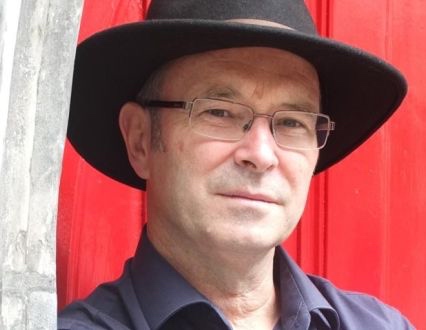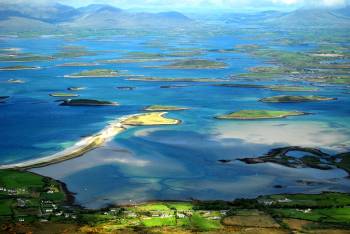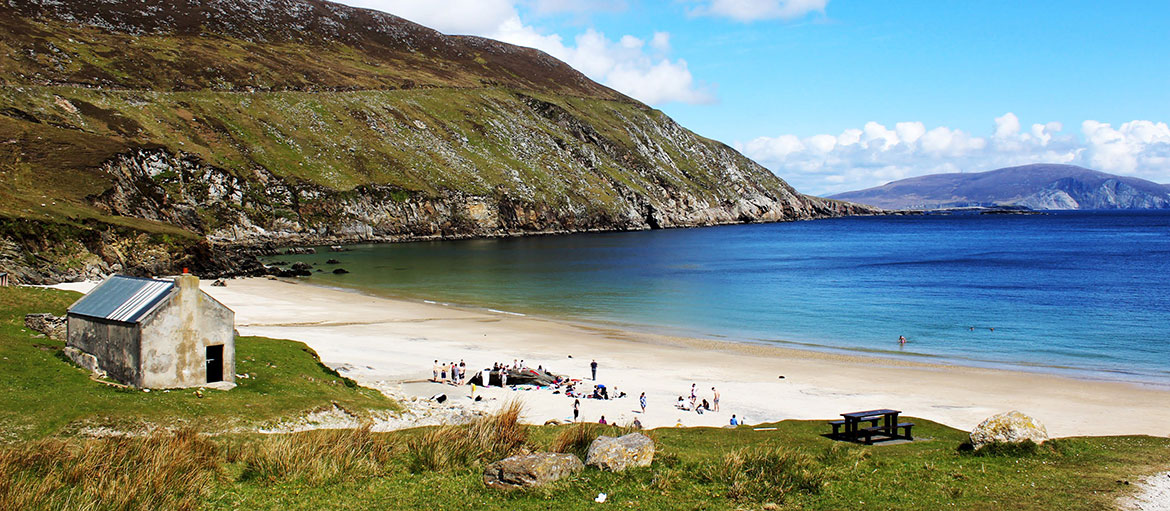Note: This book was WINNER of the Irish Book Award for Novel of the Year when it was published in Ireland in 2016. It was also WINNER of the Goldsmiths Prize.
“Oblivion…that fissure in creation where everything is consumed in the raging tides and swells of non-being, the physical world gone down in flames…and pulling with it also all those human rhythms that bind us together and draw the world into a community, those daily rites, rhythms and rituals upholding the world like solar bones, that rarefied amalgam of time and light…visible from the moment I get up in the morning…”
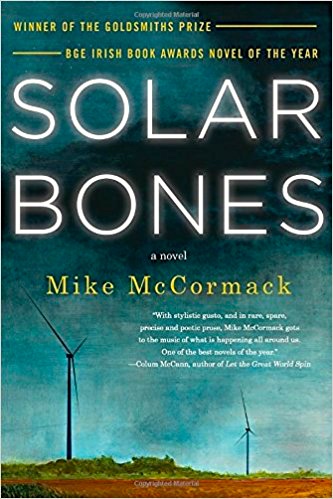 Marcus Conway, a sensitive man in his early fifties, hears the Angelus bell, a call to prayer, upon returning to his house in the Mayo village of Louisburgh, where his family has lived for unnumbered generations. He is “pale and breathless” – confused, even – and notes that “There is something strange about all this, some twitchy energy in the ether which has affected me from the moment those bells began to toll, something flitting through me, a giddiness drawing me.” He has had a busy morning, with meetings and his job as a civil engineer, but he is home alone at last, his wife at work as a teacher, his artist daughter Agnes happy with her first art show, controversial as it was, and his son Darragh in Australia, exploring new worlds. Standing in his kitchen, he feels as if “there are thresholds to cross, things to be settled, checks to be run,” and as he picks up and reads the local newspaper left for him by his wife, he sees front-page stories telling that “the world is going about its relentless business of rising up in splendour and falling down in ruins with wars still ongoing in foreign parts… while closer to home, the drama is in a lower key but real nonetheless…you can feel the flesh and blood element twitching in them.”
Marcus Conway, a sensitive man in his early fifties, hears the Angelus bell, a call to prayer, upon returning to his house in the Mayo village of Louisburgh, where his family has lived for unnumbered generations. He is “pale and breathless” – confused, even – and notes that “There is something strange about all this, some twitchy energy in the ether which has affected me from the moment those bells began to toll, something flitting through me, a giddiness drawing me.” He has had a busy morning, with meetings and his job as a civil engineer, but he is home alone at last, his wife at work as a teacher, his artist daughter Agnes happy with her first art show, controversial as it was, and his son Darragh in Australia, exploring new worlds. Standing in his kitchen, he feels as if “there are thresholds to cross, things to be settled, checks to be run,” and as he picks up and reads the local newspaper left for him by his wife, he sees front-page stories telling that “the world is going about its relentless business of rising up in splendour and falling down in ruins with wars still ongoing in foreign parts… while closer to home, the drama is in a lower key but real nonetheless…you can feel the flesh and blood element twitching in them.”
As Marcus Conway muses about his life and family, and his village “blistered with shrines and grottoes and prayer houses and hermitages,” he sees the whole of County Mayo as a “bordered realm of penance and atonement,” with three young men starving themselves to death as a political statement, while a young hermit living in the hills, with the blessing of the Vatican, has just come forth with her message to the world: “Hell is real and it’s not empty.” She offers no message of a Redeemer. As Marcus continues reading the paper, he comments that “This is how you get carried away, sitting here in this kitchen carried away on an old theme swept up on a rush of words and associations strewn out across the length and breadth of this county, a hail of images surging through me while at the bottom of the page another story….” That story tells of a construction site which may become part of a massive toxic dump to process industrial and medical waste, and he ruminates on his own job as a civil engineer and his father’s work in construction on the original building on that site which has been shut down now for years because of its pollution – the walls, roofs and ceilings sheathed in asbestos.
With his mind in high gear, Marcus Conway continues his free-associating and his revisiting of memories, letting them flow, revealing himself to be an ordinary man with a big heart, some failings, and visions of the future to accompany his vibrant memories of the past. Here author Mike McCormack involves the reader directly in the action, creating an “experimental” novel which some have compared to Proust, Flann O’Brien, Samuel Beckett, and James Joyce. Personally, I think those comparisons are unfair to McCormack. The main character’s free associations here have real structure, and the sense of place and time are vibrant and inclusive of the reader. The reader comes to know Marcus Conway and becomes involved in his life in ways that I, at least, have never experienced with Joyce and other experimental novelists, some of whom seem more interested in the experiments than in creating living characters.
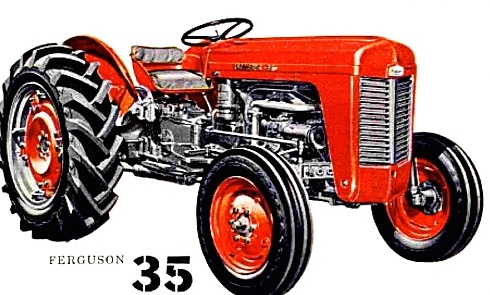 Author McCormack creates a real, thinking man, and he does it through Marcus Conway’s memories. Early in the novel, for example, Marcus reminisces about his engineer father, who loved his Massey Ferguson 35 tractor. One day Marcus comes home from school to discover that his father has removed the engine, has broken it down into all its components, and laid it out on the floor – everything – because “it was burning oil.” Even at this young age, Marcus recognizes that “my father had succumbed to the temptation to take something apart just to see how it was put together, to know intimately what it was he had put his faith in…” For Marcus, however, “this may have been my first moment of anxious worry about the world, the first instance of my mind spiraling beyond the immediate environs of hearth, home and parish, toward the wider world beyond…my imagination took fright and soared to some wider, cataclysmic conclusion about how the universe itself was bolted and screwed together, believing I saw here how heaven and earth could come unhinged…” Forever looking for answers, if any, for the chaos in the world, Marcus Conway continues to reconstruct the details of his life, comments on any resolutions he has made, and goes on to the next issue, drawing in the reader who accompanies him on his “journey.”
Author McCormack creates a real, thinking man, and he does it through Marcus Conway’s memories. Early in the novel, for example, Marcus reminisces about his engineer father, who loved his Massey Ferguson 35 tractor. One day Marcus comes home from school to discover that his father has removed the engine, has broken it down into all its components, and laid it out on the floor – everything – because “it was burning oil.” Even at this young age, Marcus recognizes that “my father had succumbed to the temptation to take something apart just to see how it was put together, to know intimately what it was he had put his faith in…” For Marcus, however, “this may have been my first moment of anxious worry about the world, the first instance of my mind spiraling beyond the immediate environs of hearth, home and parish, toward the wider world beyond…my imagination took fright and soared to some wider, cataclysmic conclusion about how the universe itself was bolted and screwed together, believing I saw here how heaven and earth could come unhinged…” Forever looking for answers, if any, for the chaos in the world, Marcus Conway continues to reconstruct the details of his life, comments on any resolutions he has made, and goes on to the next issue, drawing in the reader who accompanies him on his “journey.”
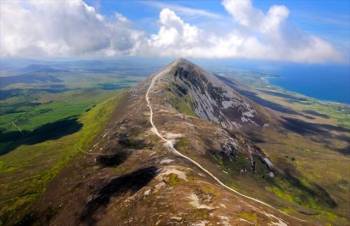
Mentioned several times in the novel, Croagh Patrick is the site of pilgrimages in County Mayo. See more information in photo credits.
I have not mentioned the book’s “elephant in the room” until now because it may be off-putting for some readers – as it was for me, at first: The entire novel is written as one, single sentence. What becomes obvious, once a reader gets started in this book, however, is that this is the perfect form for Marcus Conway’s story, as he starts reading the newspaper in his kitchen and then moves into aspects of his life, changing subjects and time periods, and revisiting scenes which have left their marks on him. These are, legitimately, the streams of Conway’s consciousness, and author McCormack makes sure that they connect into a whole as the reader continues reading. “Paragraphs,” break up the look of the novel and allow the reader some breathing space as the subjects and Marcus’s observations change, and I found myself becoming so involved in Marcus Conway’s life and comments about chaos vs. order in his and the world’s universe that I actually forgot that this whole book was only one sentence, so carefully does McCormack move from one subject to another and control the pacing of the story. Some anxious critics have given away the ending in their reviews, and that is sad. The author has carefully controlled the novel and that early revelation is unnecessary. Ultimately, this unique novel stands on its own, every aspect of it – including the one-sentence format – working to make author Mike McCormack’s novel a perfect amalgam of form and substance and a thrill to read.
Photos: The author’s photo appears on https://www.irishtimes.com/
Louisburgh, County Mayo, is where narrator Marcus Conway and author Mike McCormack both live, on Clew Bay. The small islands here are “sunken drumlins” from an early geological period. https://i.pinimg.com/
Marcus’s father was obsessed with his Massey Ferguson 35 tractor, and when he took it apart to fix its “burning oil,” he inspired Marcus’s first exposure to what Marcus thought of as chaos in a universe which he had previously imagined as permanently bolted and screwed together. https://img0.etsystatic.com
Croagh Patrick, 764 meters tall, gets over a million visitors a year. According to Wiki: “On the last Sunday in July, thousands of pilgrims climb Croagh Patrick in honour of Saint Patrick who, according to tradition, fasted and prayed on the summit for forty days in the year 441. Masses are held at the summit, where there is a small chapel. Some climb the mountain barefoot, as an act of penance, and carry out ’rounding rituals’, in which they pray while walking sunwise around features on the mountain.” https://www.geocaching.com
Achill Island is the largest of the islands off the west coast of Ireland, in Clew Bay: http://www.achillproperty.com/
